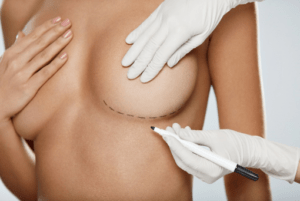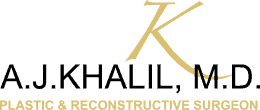
- Board-certified plastic surgeon
- Recipient of numerous awards, including “Compassionate Doctor Award” “Patients’ Choice Award” and “Most Honored Professionals”
- Complete dedication to patient safety and satisfaction
- Emphasis on personalized treatment plans that align with the individual patient’s unique goals
- Friendly, knowledgeable staff
- State-of-the-art technology and clean, modern office
- Track record of consistently beautiful, natural-looking results

There are several reasons a woman might turn to Dr. Khalil to remove her implants. Some women no longer like the look of their implants or have other aesthetic concerns. For other women it’s based on symptoms or concerns related to breast implant illness or breast implant-associated anaplastic large cell lymphoma (BIA-ALCL).
No matter what the reason, Dr. Khalil is committed to providing exceptional patient care. He guides patients through the entire experience, from planning to undergoing surgery and recovering from the operation.
Who is a Candidate for Breast Implant Removal Surgery?
Some of the breast explant candidates Dr. Khalil meets are bothered by the way their implants look and feel. They may feel as though they were happier with their appearance before getting implants. Other women find that their implants get in the way of certain activities or tasks, or their implants no longer align with their stage of life or goals.
Still other women develop an implant-related complication called capsular contracture, which is a hardening of the scar tissue surrounding the implant. Implants that have dropped below the natural breast crease, developed rippling, ruptured or developed other complications also must be removed.
More recently, Dr. Khalil has met a lot of breast explant candidates who are concerned about their implants leading to an autoimmune disease or worsening an existing health condition. These women experience symptoms such as cognitive dysfunction, unexplained fatigue and muscle pain that they believe is caused by “breast implant illness.”

Another concern is breast implant-associated anaplastic large cell lymphoma (BIA-ALCL). This rare form of lymphoma develops around breast implants (most often implants with textured surfaces). Symptoms of BIA-ALCL include pain, breast enlargement, lumps in the breast or armpits, skin rashes, hardening of the breasts and fluid collection that develops at least a year after implant placement. The FDA has stated that women with textured implants do not need to have them removed unless they are diagnosed with BIA-ALCL; however, the thought of developing the cancer can cause some women to pre-emptively remove their implants.
Preparing for Breast Explant Surgery
Dr. Khalil provides patients with several essential instructions for preparing for breast explant surgery. Most importantly, patients are asked to limit their consumption of alcohol and stop taking aspirin, anti-inflammatory medications, other medications, vitamins and supplements known to cause bleeding or other complications from surgery. Patients are also encouraged to prepare for surgery by arranging for a friend or family member to drive them home after the procedure and stay with them for at least 24 hours.
Breast Implant Removal Surgery Details
Prior to explant surgery, Dr. Khalil meets one on one with each patient to discuss her implant-related concerns and develop a treatment plan to remove her implants.
The surgery itself is performed with general anesthesia or local anesthesia with sedation. Dr. Khalil may be able to perform the surgery through an incision in the location used to originally place the implants (e.g., the crease where the breast meets the torso or around the areola). Alternatively, he might need to make the incision in a different area of the breast. The incision location depends on factors such as whether a breast lift is needed after the implants are removed.
Breast Implant Removal Recovery
After surgery, bruising and swelling of the breasts is common, but temporary. Patients are encouraged to rest as much as possible for a few days after surgery, resuming light activity when they feel ready. Most patients can resume work and start to feel like themselves again within two weeks of the procedure.
Why Choose Dr. Khalil for Breast Explant Surgery
Women from Beverly Hills and beyond trust their breast implant removal to Dr. Khalil for the following reasons:
- Board-certified plastic surgeon
- Recipient of numerous awards, including “Compassionate Doctor Award” “Patients’ Choice Award” and “Most Honored Professionals”
- Complete dedication to patient safety and satisfaction
- Emphasis on personalized treatment plans that align with the individual patient’s unique goals
- Friendly, knowledgeable staff
- State-of-the-art technology and clean, modern office
- Track record of consistently beautiful, natural-looking results
Breast Implant Removal Frequently Asked Questions
How do I know if I need my implants removed?
In some cases, it is apparent that a problem has occurred and implants need to be removed. For instance, if the implants look as though they have ruptured, shifted out of position or developed ripples, the need for breast augmentation revision is obvious. BIA-ALCL, which is a concern among women with some types of textured implants, causes symptoms that are difficult to ignore, such as breast pain, enlargement, rashes or hardening of the implant.
Not every woman who undergoes breast revision experiences pain or symptoms related to her implants. Some women make the personal choice to remove their implants because they no longer like the way their breasts look and/or feel.
What is a “capsule?” What does it have to do with breast implant removal?
A capsule is scar tissue that the body naturally forms around the breast implant. Capsular contracture is a complication in which the scar tissue tightens around an implant and causes pain and visible deformities.
In some breast explant cases, the capsule needs to be removed in addition to the implant. An “en bloc capsulectomy” refers to removing the entire capsule with the entire implant still inside of it. A capsulectomy removes the entire capsule and implant separately.
Dr. Khalil will review the details of each individual patient’s case before recommending the most appropriate surgical approach.
Will I need a breast lift after my implants are removed?
Many women can benefit from a breast lift at the time of breast implant removal if the breast skin has stretched or sagged. This happens if it has been a long time since the implants were placed, the patient has had children and breastfed or if her implants are very large.
During a breast lift, Dr. Khalil removes excess breast skin and lifts and tightens the breast tissue higher on the chest. He can also resize the areolas to fit the newly shaped breasts if needed.
Will I have additional scarring after breast implant removal?
Dr. Khalil is normally able to remove implants through the same incision sites used to place the implants. It will take time for the scars to flatten and fade after breast implant removal. The scars will never completely disappear, but Dr. Khalil can recommend scar management techniques and products.
Schedule a Consultation With Dr. Khalil
If you are interested in breast explant surgery for aesthetic or health-related reasons, Dr. Khalil can help. Please contact our Beverly Hills office to schedule a consultation and discuss your options.

Our Reviews
